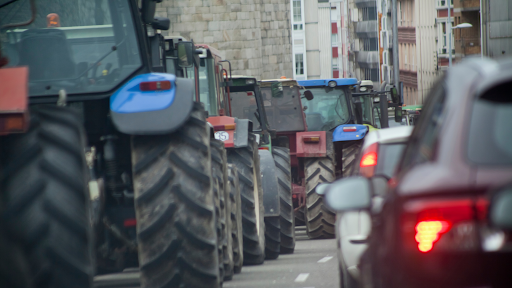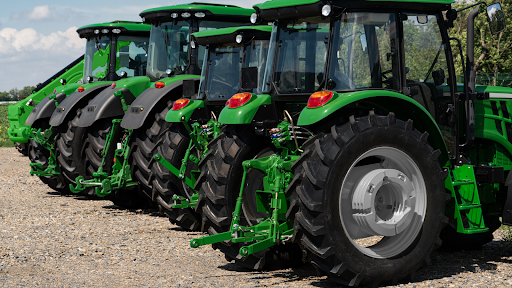
07 Mar Farmers Protest Across Europe: Here’s Why
In recent weeks, the streets of European cities have been filled with a familiar sight – tractors driven by protesting farmers. The protests, which have spread across numerous EU member states including Belgium, France, Germany, Greece, Hungary, Italy, Latvia, Lithuania, the Netherlands, Poland, Spain, and Romania, have drawn attention to the challenges facing Europe’s agricultural sector.
The root causes of the discontent are varied but interconnected, encompassing issues such as competition from cheaper imports, rising energy and fertilizer costs, and stringent environmental regulations.
The protests were characterized by blockades, dumping of produce, and fiery demonstrations etc. However, a deeper look reveals a multifaceted narrative that extends beyond mere dissatisfaction with income and regulations.
In this article, we will take a deep dive into the grievances of the farmers, and the actions taken by their governments to mitigate the crises.
What are the Causes of these Protests?
The protests, which began as localized expressions of dissatisfaction, have now gained momentum across the continent. The heart of the European Union, Brussels, witnessed farmers’ fury as they clashed with authorities during a summit on Ukraine, hurling eggs and causing disruptions. In France, known for its agricultural prowess, highways leading to major cities were blocked, reflecting the widespread frustration among farmers. The scene in Brussels, with 900 tractors converging on the city streets, epitomized the scale and intensity of the discontent. Liquid manure sprayed, tires set ablaze, and clashes with law enforcement underscored the depth of frustration among Europe’s agricultural community.
This was not an isolated incident; similar protests unfolded simultaneously in Madrid and along the Polish-German border, in other countries including Germany, Greece, Portugal, and the Netherlands.
At the core of these protests lies a complex web of issues that have pushed farmers to the brink. Economic strains, exacerbated by rising costs of energy, fertilizer, and transportation, coupled with plummeting prices for agricultural products, have left many farmers struggling to make ends meet. The impact of geopolitical events, such as Russia’s war in Ukraine, has further destabilized the agricultural sector, adding to the financial woes of farmers.
Moreover, the influx of cheap agricultural imports from countries like Ukraine has intensified competition, leaving European farmers feeling undercut and disadvantaged. Calls for fair competition have resonated strongly, with farmers highlighting disparities in regulatory standards between European producers and their foreign counterpart
In France, protests have been fuelled by concerns over reduced agricultural fuel subsidies and pesticide restrictions, both of which directly impact emissions and biodiversity. Similarly, in Lithuania, farmers are rallying against stricter rules on agricultural fuel subsidies and tax exemptions on petroleum gas, highlighting their concerns about climate-related policies.
In contrast, protests in countries like Belgium and Romania are more focused on broader economic and regulatory challenges, such as the EU’s nature restoration law, trade agreements leading to cheap imports, and slow subsidy payments. While these issues may not be directly tied to climate change or biodiversity, they reflect farmers’ anxieties about their livelihoods and the future of agriculture in the EU.
One common thread among the protests is a call for greater support and recognition of the agricultural sector’s role in addressing environmental challenges. In Greece, for instance, farmers are demanding more infrastructure to protect farms from extreme weather events and improved flood prevention measures. These demands underscore the urgent need for climate adaptation strategies tailored to the agricultural sector’s unique vulnerabilities.

EU Policies Under Scrutiny
For years, farmers have borne the brunt of policies that prioritize international competitiveness over their livelihoods. As production costs soar and prices for their goods stagnate or plummet, farmers find themselves trapped in a cycle of debt and diminishing returns. The dream of a decent income has become elusive, driving many to the edge of desperation.
Central to this debate is the EU’s pursuit of free trade agreements, such as the proposed deal with Mercosur countries. Critics argue that such agreements threaten to flood European markets with cheap imports, undercutting local producers and compromising food safety and environmental standards.
Moreover, the EU’s “farm to fork” strategy, aimed at promoting sustainable food production, has become a focal point of concern. While the strategy aims to reduce pesticide and fertilizer use to mitigate environmental harm, farmers are concerned about the potential impact on their operations and livelihoods. Balancing environmental objectives with the need for viable agricultural practices remains a central challenge for policymakers.
One other key issue highlighted by the protesters is the impact of free trade agreements and deregulation on their ability to compete in the market. Farmers argue that these policies have led to a flood of cheap imports, particularly from countries like Ukraine, which benefit from waived duties. In Poland, farmers blocked highways to protest against cheap imports from Ukraine, while in Madrid, protesters called for the EU to loosen regulations that they believe hinder their competitiveness.
The European Union’s agricultural policies, particularly the Common Agriculture Policy (CAP), have also come under fire. For instance, farmers in Madrid expressed frustration with the bureaucratic burden imposed by CAP regulations, lamenting that it’s impossible to put up with these rules.
Environmental concerns have also fueled farmer anger, particularly regarding the European Green Deal. While the deal aims to address climate change and promote sustainability, farmers fear that stringent regulations, such as carbon taxes and pesticide bans, will disproportionately burden them without adequate support or consideration for their livelihoods.
Importantly however, not all farmers are advocating for a rollback of environmental regulations. While some are calling for exemptions from certain standards, others, like La Via Campesina, are urging the EU to set minimum support prices to incentivize environmentally sustainable practices.
What Has been Responses so Far?
Governments and the European Union have responded to the protests with a mix of concessions and promises. Brussels announced a delay in implementing certain regulations, while individual countries like Germany and France have offered tax rebates and financial support to ease the burden on farmers. However, many farmers argue that these measures are insufficient and are calling for more substantive action.
But the protests have broader political implications, with far-right parties seeking to capitalize on farmer grievances ahead of European Parliament elections. In the Netherlands, the Farmers-Citizen Movement party (BBB) capitalized on farmers’ grievances, exploiting anti-system and anti-ecology sentiments to garner electoral support. With the European Parliament elections on the horizon, there are concerns that similar trends may emerge across the continent.
Looking Ahead
As the backbone of Europe’s food system, farmers play a vital role in ensuring food security and environmental sustainability. Ignoring their demands risks exacerbating existing inequalities within the agricultural sector and jeopardizing the future of farming in Europe. The farmers’ protests serve as a potent reminder of the urgent need for comprehensive solutions that address the root causes of agricultural distress while charting a path towards a more equitable and sustainable future. The farmers’ protests are not just about agricultural policy; they are a rallying cry for a fairer, more equitable future for all. It is a call to action that demands attention not just from policymakers, but from all those who believe in the power of collective voice to effect change. Ultimately, the farmers’ protests serve as a wake-up call for policymakers to re-evaluate agricultural policies and prioritize the needs of those who work the land. Failure to do so risks further alienating an already marginalized group and undermining the long-term viability of European agriculture.

Sorry, the comment form is closed at this time.